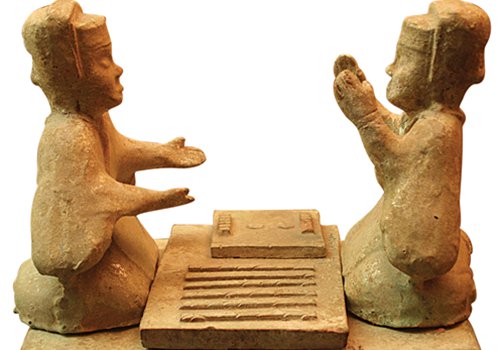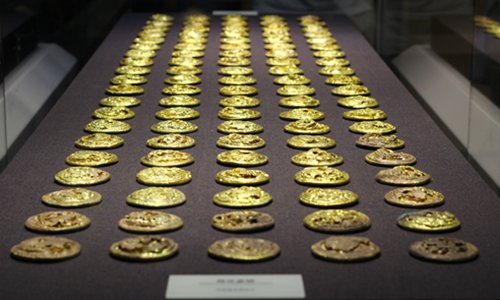An ancient Chinese board game manual of liubo, ancestor of today's chess games, was first found in one of the most well-known 2,000-year-old tombs in China, indicating that the old board role-playing game, having disappeared for more than 1,500 years, may come back.

Picture is two pottery made figurines of Han Dynasty (206BC-AD220) who are playing liubo chess. (Photos: VCG)
Thousands of bamboo slips, which were unearthed in 2015 from the renowned Haihun Marquis tomb from the Han Dynasty (206BC-AD220), recently confirmed to be inscribed with rules and guides of liubo chess, Beijing Youth Daily reported on Saturday.
The tomb is located in Nanchang, East China's Jiangxi Province.
Yang Jun, head of the archeological team responsible for the tomb, said that this is a significant unearthing as "after recovering the manual, we can know how to play the chess game."
Yang said that with the playing method, liubo chess can be turned into creative products open to the public, the Beijing Youth Daily reported.
According to the Weibo account of the People's Daily, the board role-playing game could date back to the Shang Dynasty (c.1600BC-1046BC) and became very popular in the Han Dynasty, but gradually disappeared after that time.
Two players of liubo chess both have six chess pieces and they can move their pieces after dicing.

285 gold cakes are unearthed from the Haihun marquis tomb in Nanchang, East China's Jiangxi Province, each of which is 0.25 kilograms. (Photo: IC)
The excavation of the Haihun Marquis tomb began in 2011. The remains of the Marquis were found in a coffin in an interior chamber and removed in January 2016. A seal inside the coffin bearing the characters "Liu He," the Marquis' name, helped confirm his identity, reported the Xinhua News Agency.
More than 10,000 artifacts have been unearthed from the tomb so far, including variety of ancient musical instruments, different gold vessels and five high-class carriages, said the website of the tomb exploration.
Besides liubo, there are some other kinds of board games in ancient China such as yezixi, initially recorded in Tang Dynasty (618-907), rules of which are similar with playing a standard 52-card deck, as said by the People's Daily.


